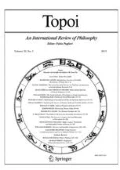Abstract
I argue for a basically Sartrean approach to the idea that one's self-concept, and any form of knowledge of oneself as an individual subject, presupposes concepts and knowledge about other things. The necessity stems from a pre-conceptual structure which assures that original self-consciousness is identical with one's consciousness of objects themselves. It is not a distinct accomplishment merely dependent on the latter. The analysis extends the matter/form distinction to concepts. It also requires a distinction between two notions of consciousness: one relates to the employment of already formed concepts, the other to the structures of imaginative apprehension that help to constitute (empirical) concepts from the start. We need to see that (1) so far as objects are only conceptualized appearances, the material through which we apprehend them must be reflected in that apprehension itself; (2) the corresponding material consists of a manifold of pre-conceptually active anticipations and retentions concerning the course of one's own experience. The resultant structure imposes an orientation on the world of appearances that does not derive from a concept of oneself as an individual in it, but that nevertheless provides the only possible basis for such a concept. One's self-concept, at least as empirical subject, is simply that ofwhatever subject is indicated, in an appropriate way, by that orientation.
Similar content being viewed by others
References
Academie Francaise: 1932,Dictionnaire de l'Academie Francaise, 8th ed., Paris.
Anscombe, G. E. M.: 1975, ‘The first person’, Guttenplan, Samuel (ed.),Mind and Language, Oxford University, 45–65.
Aquila, Richard E.: 1983,Representational Mind: A Study of Kant's Theory of Knowledge, Indiana University, Bloomington.
Aquila, Richard E.: 1987, ‘Matter, form, and imaginative association in sensory intuition’, Bernard den Ouden (ed.),New Essays on Kant, Lang, Bern.
Bailey, Nathan: 1730,Dictionarum Brittanicum (repr. 1969), Georg Olms, Hildesheim.
Bennett, Jonathan: 1966,Kant's Analytic, Cambridge University, pp. 111ff.
Castañeda, Hector-Neri: 1966, ‘He: A study in the logic of self-consciousness’,Ratio 8, 130–57.
Castañeda, Hector-Neri: 1968, ‘On the phenomeno-logic of the I’,Akten des XIV. Internationalen Kongresses für Philosophie.
Centre National de la Recherche Scientifique: 1977,Trésor de la Langue Francaise, Paris.
Guyer, Paul: 1980, ‘Kant on apperception anda priori synthesis’,American Philosophical Quarterly 17, 205–212.
Guyer, Paul: 1981, ‘Kant's tactics in the transcendental deduction’,Philosophical Topics 12, 157–199.
Guyer, Paul: 1983, ‘Kant's intentions in the refutation of idealism’,The Philosophical Review 92, 329–383.
Husserl, Edmund: 1913,Ideas Pertaining to a Pure Phenomenology and to a Phenomenological Philosophy: First Book, Kersten, F. (tr.):l982, Nijhoff, Haag.
Husserl, Edmund: 1952,Ideen zu einer reinen Phänomenologie und phänomenologischen Philosophie: Zweites Buch, Biemel, Marley (ed.), Husserliana 4, Nijhoff, Haag.
Husserl, Edmund: 1966,Analysen zur Passiven Synthesis, Fleischer, Margot (ed.), Husserliana 11, Nijhoff, Den Haag.
Johnson, Samuel: 1755,A Dictionary of the English Language (repr. 1967), AMS Press, New York.
Jung, Gertrud: 1933, ‘Suneidesis, Conscientia, Bewusstsein,’Archiv für die gesamte Psychologie 89, 525–540.
Kant, Immanuel: 1781, 1787,Critique of Pure Reason, Smith, Norman Kemp (tr.): 1965, St. Martin's, New York.
Kant, Immanuel: 1798,Anthropologie in pragmatischer Hinsicht, Prussian Academy of Sciences (ed.): 1917,Gesammelte Schriften 5, Georg Reimer, Berlin.
Kant, Immanuel: 1926, 1928,Reflexionen zur Metaphysik, Prussian Academy of Sciences (ed.),Gesammelte Schriften 17 and 18, Walter de Gruyter, Berlin.
Kenny, Anthony: 1979, ‘The first person’, Diamond, Cora and Teichman, Jenny (eds.),Intention and Intentionality: Essays in Honor of G. E. M. Anscombe, Cornell University, Ithaca, 3–13.
Lewis, C. S.: 1960,Studies in Words, Cambridge University, ch. 8.
Nelkin, Norton: 1986, ‘Pains and pain sensations’,The Journal of Philosophy 83, 129–148.
Paton, H. J.: 1936,Kant's Metaphysic of Experience 1, Allen & Unwin, London.
Remnant, Peter and Bennett, Jonathan: 1981, ‘Notes’,G. W. Leibniz, New Essays on Human Understanding, Cambridge University, p. xxxvi.
Rosenberg, Jay: 1986, ‘“I Think”: Some Reflections on Kant's Paralogisms’,Midwest Studies in Philosophy 10, 503–29.
Sartre, J.-P.: 1936,The Transcendence of the Ego, Williams, Forrest and Kirkpatrick, Robert (trs.): 1957, Noonday Press, New York, pp. 44ff.
Sartre, J.-P.: 1943,Being and Nothingness, Barnes, Hazel E. (tr.): 1966, Washington Square Press, New York, pp. 9ff., 119ff.
Smith, Norman Kemp: 1923,A Commentary to Kant's ‘Critique of Pure Reason’, 2nd ed. (repr. 1962), Humanities Press, New York.
Strawson, P. F.: 1966,The Bounds of Sense, Methuen, London, pp. 93ff.
Strawson, P. F.: 1970, ‘Imagination and perception’, Foster, Lawrence and Swanson, J. W. (eds.),Experience and Theory, University of Massachusetts, Amherst, p. 41.
Ujvari, Marta: 1984, ‘Personal identity reconsidered’,Kant-Studien 75, 328–339.
Wolff, Robert Paul: 1963,Kant's Theory of Mental Activity, Harvard University, Cambridge.
Author information
Authors and Affiliations
Rights and permissions
About this article
Cite this article
Aquila, R.E. Self-consciousness, self-determination, and imagination in Kant. Topoi 7, 65–79 (1988). https://doi.org/10.1007/BF00776210
Issue Date:
DOI: https://doi.org/10.1007/BF00776210


